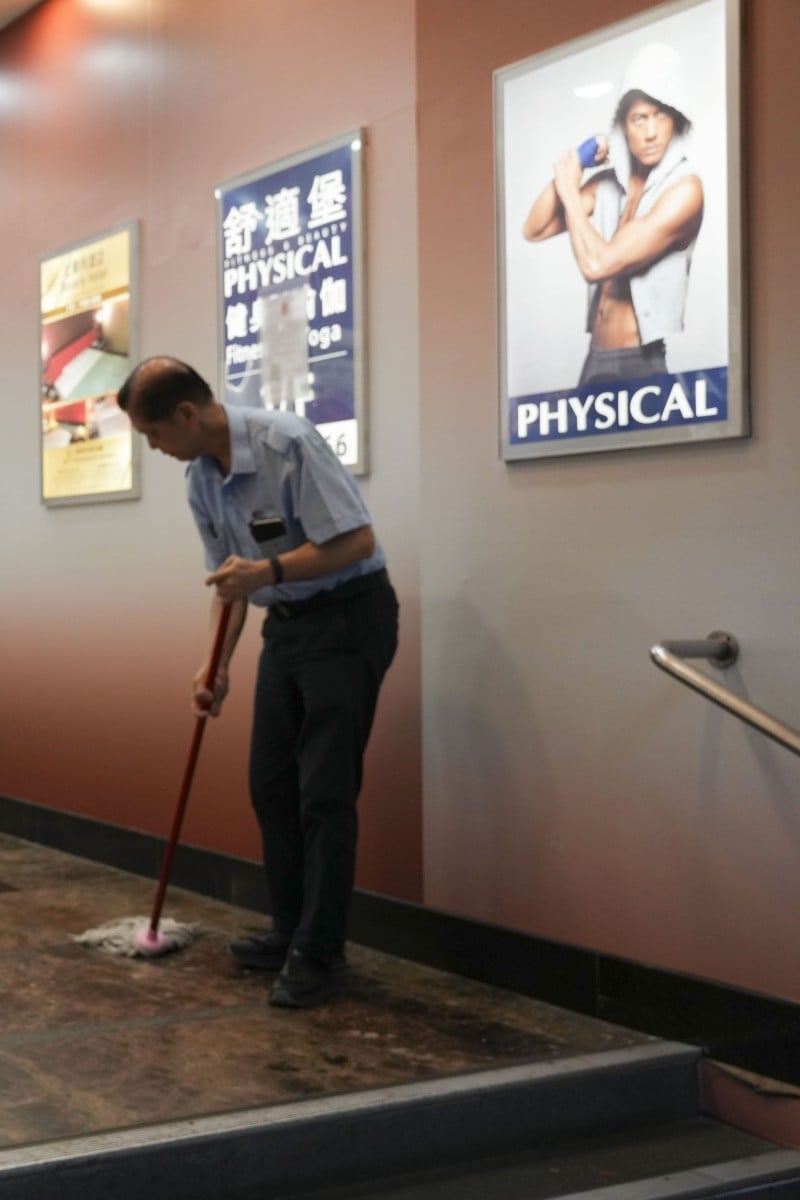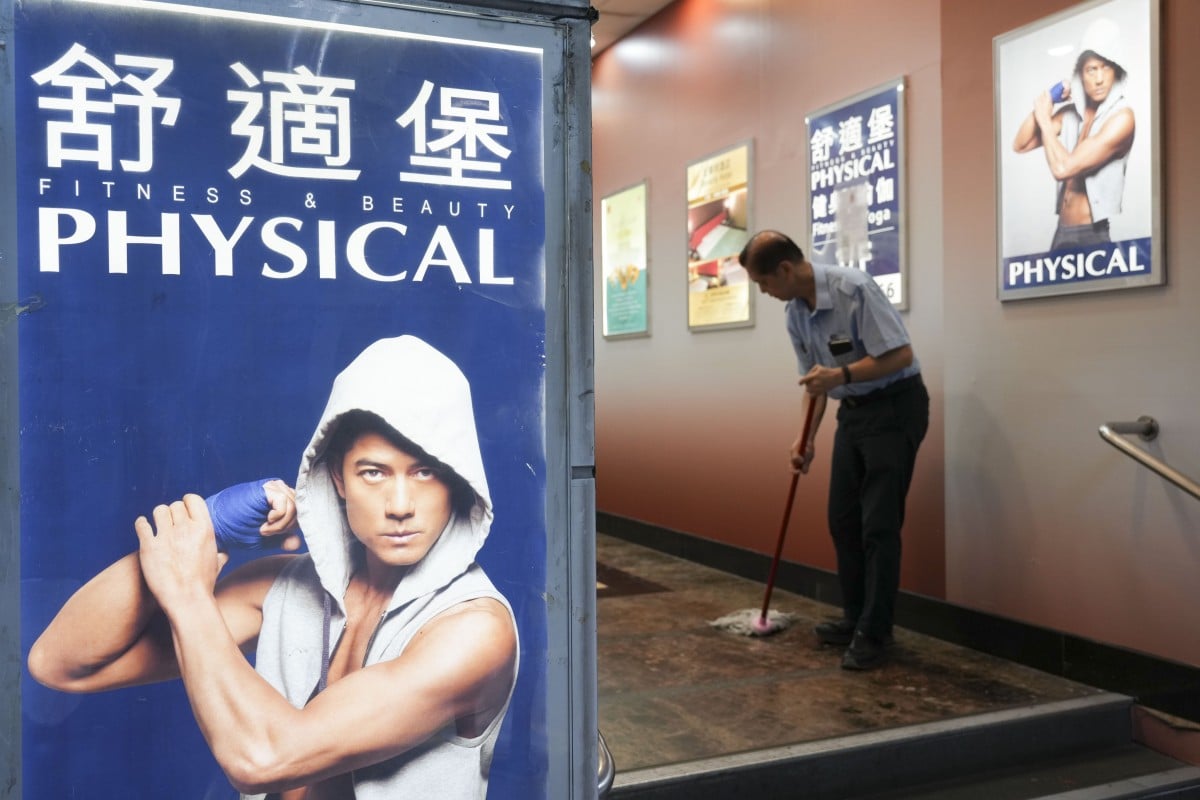
Deep Dive: Hong Kong gym chain closure leads to arrests, sparks discussions on consumer rights
Nearly 4,000 complaints have been filed against Physical for failing to deliver prepaid services amounting to more than HK$133 million
 Hong Kong gym chain Physical Fitness & Beauty announced it was shutting down after 38 years of business. Photo: Sam Tsang
Hong Kong gym chain Physical Fitness & Beauty announced it was shutting down after 38 years of business. Photo: Sam TsangDeep Dive delves into hot issues in Hong Kong and mainland China. Our easy-to-read articles provide context to grasp what’s happening, while our questions help you craft informed responses. Check sample answers at the end of the page.
News: Hong Kong authorities arrest two Physical gym directors over allegations of unfair trade practices
-
Consumer Council said the biggest case involves HK$1.86 million payment for more than 1,900 classes
-
Lawmakers have called for more consumer protections when buying prepaid services
Hong Kong authorities have arrested two directors of Physical Health Centre. As of September 15, a city watchdog had received nearly 4,000 complaints involving around HK$133.5 million (US$17.1 million) against the gym for failing to deliver prepaid services.
According to the city’s Consumer Council, the biggest individual claim involved a contract that would only take effect in 2037. The contract involved payment for more than 1,900 private fitness classes and a 10-year membership amounting to HK$1.86 million.
Luk Ngai-keung was taken into custody after surrendering to customs, while his wife, Ho Yuk-wah, was apprehended after officers raided her home on Wednesday morning. A citywide manhunt was also launched for other people involved in the case.
The directors were detained for allegedly violating the Trade Descriptions Ordinance by having no intention of supplying services after accepting customer payments. The offence is punishable by up to five years in prison and a HK$500,000 fine.
The government said earlier this month that an interdepartmental team would investigate the alleged offences under the Trade Descriptions Ordinance and whether there were other suspected crimes. Several of the chain’s trainers have filed claims for unpaid wages, and rent has gone unpaid at some branches.
Deep Dive: Hongkongers are earning less money as unemployment rises
Politicians and experts have said that Hong Kong should better regulate the sale of prepaid services to protect consumers. Lawmaker Doreen Kong Yuk-foon cited figures released by the council, which had received about 7,700 complaints about prepaid services over the past three years, amounting to around HK$200 million.
She argued that the protection offered under the Trade Descriptions Ordinance did not safeguard consumers’ rights to prepaid services, noting the city lagged far behind other jurisdictions. “We are very backward. If we do not act, it will affect the service industry, and consumers will lose confidence in the sector,” Kong said.
Kelvin Kwok Hiu-fai, an associate professor at the faculty of law at the University of Hong Kong, said the city needed to introduce a cooling-off period as proposed by the government in 2019.
The proposal applied to some fitness centres and beauty salons and called for a cooling-off period of up to seven working days, giving customers time to terminate the deal.
Staff writers
Question prompts
1. What was the primary reason behind the arrests of two Physical gym directors?
(1) Violating labour laws by underpaying staff members
(2) Breaching health and safety regulations at their gym facilities
(3) Allegedly accepting payments without intending to supply services
(4) Engaging in fraudulent advertising practices
2. List ONE key case revealed by the Consumer Council regarding the prepaid services offered by the gym chain and ONE action taken by the authorities in response to these cases.
3. Should Hong Kong amend its consumer protection laws in regard to prepaid services? If so, how? Explain using News and your own knowledge.
Photo
Question prompts
1. What is being shown in this picture? What is unusual about it, and how is it relevant to News?
2. How can Hong Kong better protect consumers from falling victim to long-term prepaid contracts and dishonest business practices? Explain using News, Photo and your own knowledge.
Table
Question prompts
1. Using Table, list TWO things that look suspicious about the latest service plans offered by Physical.
2. What would you look for if you were buying a prepaid gym service plan, and why? Explain your answer using News, Issue and Table.
Issue: Hard sell tactics, rent pressures hurt Hong Kong’s big gym chains
-
Customers prefer 24-hour gyms and private facilities that offer flexible payment, industry guide finds
-
Many gym-goers were put off by trainers’ pressure to buy workout packages
Industry representatives have said that the hard sell tactics of Hong Kong’s fitness chains and their rental pressure contributed to their demise as newer gyms offered monthly payments and more flexibility.
Rex Wong Hiu-shan, the chairman of the Fitness Professionals Association, said gym-goers disliked the traditional sales tactics of personal trainers who often disrupted their workouts.
“They have hated it for ages, but they had no choice back then. Now, there are more 24-hour gyms and private gyms. Some consumers have shifted to these businesses, and the public has become more disliking of the hard sell tactic,” Wong said.
According to a study by Hong Kong Fitness Guide last October, there were 963 fitness and yoga centres in the city, including 214 that operated around the clock. The number of such gyms was almost 24 times the number recorded in 2018.
Wong said that gym-goers found fitness centres operating at all hours convenient and accessible, while self-service studios allowed people to work out in privacy.
Deep Dive: Scams on the rise in Hong Kong thanks to technology and lack of regulations
Wong said established fitness centres, generally 5,000 to 10,000 sq ft in size, faced competition from new studios and rent pressures. At the same time, earnings from personal training, which they relied on, could not cover their expenses.
“During the economic slump, people’s consumption was low and brought little sales. The lack of cash flow can lead to closures,” Wong said.
Wong said that traditional chains still had the edge in attracting gym-goers with their variety of equipment and training programmes. However, this could be compromised if they engaged in hard-sell tactics or had financial problems.
Gordon Yau Yick-chung, chairman of the Hong Kong Fitness Guide, said more people were opting for 24-hour gyms because of their busy work schedules.
Yau noted an increase in boutique gyms – studios of about 500 to 2,000 sq ft – with owners who ran the business as sole coaches or had small teams of two to three trainers. These operators avoided hard sell tactics and often did not mind having a smaller client base as long as their revenue covered costs.
He noted that trainers at these gyms may focus on teaching lessons, and gave users a certain degree of flexibility and “privacy”.
Since Physical announced that it was closing, several members have shared their experiences of trainers aggressively sharing packages at the fitness chain.
“I’d be listening to music, enjoying my workout and striving to reach my goal, then suddenly get interrupted by someone coming over to sell packages,” a gym-goer surnamed Lam said on a radio show on Monday.
“I felt stressed just walking past the reception. It made me uneasy and I could not enjoy my exercise,” she said.
Staff writers
Question prompts
1. List TWO reasons why large fitness chains are suffering financially in Hong Kong.
2. According to Rex Wong, what advantages do smaller fitness centres offer customers?
3. In your opinion, could boutique gyms replace traditional gym chains? Explain using Issue and your own knowledge.
Glossary
-
Consumer Council: an organisation established by the Hong Kong government that seeks to protect consumer rights and warn people about unfair and dishonest business practices.
-
cooling-off period: a period of time after buying something during which a person can cancel a purchase, return goods that have been supplied, and get a full refund.
-
alleged: accusations or things said without firm proof. In law and journalism, you must use the word “alleged” or “allegedly” when discussing a crime if the case hasn’t been brought to court and the person has yet to be found guilty of the crime.
-
hard sell: an aggressive and forceful sales technique aimed at persuading a potential customer to make an immediate decision.
-
boutique gyms: smaller, specialised fitness facilities that offer more unique workout experiences and personalised services compared to traditional gyms.
Sample answers
News
1. C
2. The biggest case involved a contract which would only take effect in 2037. The contract included more than 1,900 fitness classes and a 10-year membership amounting to HK$1.86 million. In response to the claims, the government set up an interdepartmental team to investigate the alleged offences under the Trade Descriptions Ordinance and whether there were other suspected crimes.
3. Yes, I think that Hong Kong should amend its consumer protection laws regarding prepaid services. Many people are out a lot of money thanks to Physical. The company was knowingly scamming customers before its closure, as the chain was still selling prepaid services despite knowing they would not be able to provide them. (accept all reasonable answers)
Photo
1. A former customer at Physical gym shows his contract, which lists prepaid services that will not take effect until 2027 and expire in 2031. This is relevant to the recent news that Physical was selling prepaid services to customers when they knew they couldn’t provide them.
2. Authorities in Hong Kong could enhance consumer protection by enforcing stricter regulations on the terms and durations of prepaid contracts, conducting regular audits of businesses offering such services, and providing clearer guidelines and information to educate consumers about their rights and potential risks associated with long-term contracts. (accept all reasonable answers)
Table
1. The plan for new customers is 10 years long, and the “Supreme Black Diamond Flash Sale” is for nearly 84 years. There are also notes that the fees listed – which require a lot of money to be paid up front – don’t include additional enrolment and handling fees, which are not listed. (accept all reasonable answers)
2. I would avoid buying a prepaid plan with a long contract, as it would be risky if the business shuts down. It’s very likely I wouldn’t get my money back. I would also be sure to have all the fees explained to me so I am not caught off guard. (accept all reasonable answers)
Issue
1. Large gyms are suffering thanks to their hard sell tactics, which are off-putting for customers, and rental pressure, since they often occupy large spaces with more expensive rents.
2. Smaller gyms have smaller classes, don’t employ hard sell techniques, focus on offering classes and give users a certain degree of flexibility and privacy in their workouts.
3. There is a high chance that small boutique gyms could replace traditional gyms as they are more flexible in terms of payment and opening hours. People may also be more nervous about expensive prepaid plans following the closure of Physical. They could also appreciate the personalised attention and absence of high-pressure sales tactics. (accept all reasonable answers)